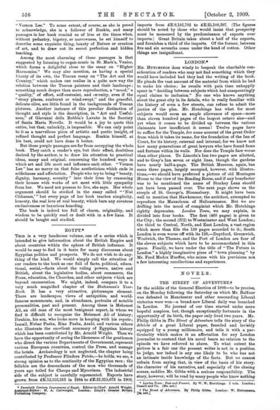EGYPT.* THIS is a very handsome volume, one of a
series which is intended to give information about the British Empire and about countries within the sphere of British influence. It would be easy to find in it texts for many discourses about Egyptian politics and prospects. We do not wish to do any- thing of the kind. We would simply call the attention of our readers to the book as one full of facts, political, educa- tional, social,—facts about the ruling powers, native and British, about the legislative bodies, about commerce, the Press, education, the Churches, and other subjects v-hich are beyond enumeration. We might, indeed, compare it to a very much magnified chapter of the Statesman's Year. Book. It has a very attractive, picturesque element. There are landscapes, views of antiquities, and world- famous monuments, and, in abundance, portraits of notable personalities, past and present. Among these is Mehemet Ali, an old man of the most benignant aspect, in whom we find it difficult to recognise the Mehemet Ali of history; Ibrahim, his son, who looks more in keeping with his repute ; Ismail, Nubar Pasha, Riaz Pasha, Arabi, and various others who illustrate the excPllent summary of Egyptian history which has been contributed by Mr. Arnold Wright. Then we have the opportunity of seeing the likenesses of the gentlemen who direct the various Departments of Government, represent various European countries, control the Press, and manage the hotels. Archaeology is not neglected, the chapter being contributed by Professor Flinders Petrie,—he holds, we see, a strong opinion as to the continuity of the Egyptian race ; the fellahin are the descendants of the men who thousands of years ago toiled for Cheops and Mycerinus. The industrial side of the subject is carefully represented. Exports have grown from £E.12,553,318 in 1884 to £E.21,315,673 in 1908,
• Tweatieth Century Impressions of Egypt. Editor-;n-Chief: Arnold Wright. Asaistant-Editor : H. A. Cartwright. London: Lloyd's Greater Britain Publishing Company.
imports from £E.8,182,702 to £E.25,100,397. (The figures should be noted by those who would insist that prosperity must be measured by the predominance of exports over imports.) Great Britain takes about a half of the exports, and furnishes a third of the imports. Of the former, between five and six sevenths come under the head of cotton. Other things are insignificant.


























































 Previous page
Previous page